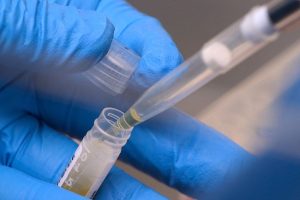NEW YORK (AP) — Over 74,000 people enrolled in experiments have been affected by the National Institutes of Health’s funding cuts, according to a new report.
Between the end of February and mid-August, funding ceased for 383 studies that were testing treatments for conditions including cancer, heart disease and brain disease. The cuts disproportionately impacted efforts to tackle infectious diseases like the flu, pneumonia and COVID-19, researchers found.
The funding cuts likely disrupted patients’ lives in different ways.
Some may have signed up for trials that never began or got delayed as institutions scrambled for alternate funding. Others could have lost access to medication or been left with an unmonitored device implant.
More still could have participated in trials only for the results to never get published.
“The disruption to the research enterprise was profound and substantial,” said Heather Pierce, who has followed NIH grant cuts for the Association of American Medical Colleges.
More broadly, the lost research harms patients who could have benefited from a possible new treatment, researchers said in the report published Monday in the journal JAMA Internal Medicine.
“The whole purpose of these clinical trials is to generate evidence on what works and doesn’t work in medicine,” said study co-author Anupam B. Jena with Harvard Medical School.
Researchers counted 11,008 NIH-funded studies during the study period. Of those, 1 in 30 lost funding.
Those clinical trial cuts may also erode trust between people and the medical institutions that support them, said Jeremy Berg, a former director of an NIH institute. Patients could think twice before participating in future research projects, worried that the funding could get pulled abruptly.
“Anybody else who’s ever approached about a clinical trial could easily feel, ‘Why should I be involved in this?’” said Berg.
Andrew Nixon, a spokesperson for the U.S. Department of Health and Human Services, said in an email that the NIH is realigning its priorities, and funding was likely cut for the clinical trials because they “prioritized ideological agendas over scientific rigor and meaningful outcomes for the American people.”
“We strongly reject the intentionally misleading portrayal of our grant management process,” said Nixon.
The NIH has cut billions of dollars in research projects under the Trump administration.
A Supreme Court decision in August paved the way for the NIH to axe hundreds of millions in a push to cut diversity, equity and inclusion efforts. Challenges to NIH’s attempted cuts to the so-called indirect costs of medical research are also making their way through the courts.
Hundreds of NIH scientists signed a letter in June decrying new policies and the grant terminations, saying that they “undermine the NIH mission, waste public resources, and harm the health of Americans and people across the globe.”
___
The Associated Press Health and Science Department receives support from the Howard Hughes Medical Institute’s Department of Science Education and the Robert Wood Johnson Foundation. The AP is solely responsible for all content.
By ADITHI RAMAKRISHNAN
AP Science Writer

